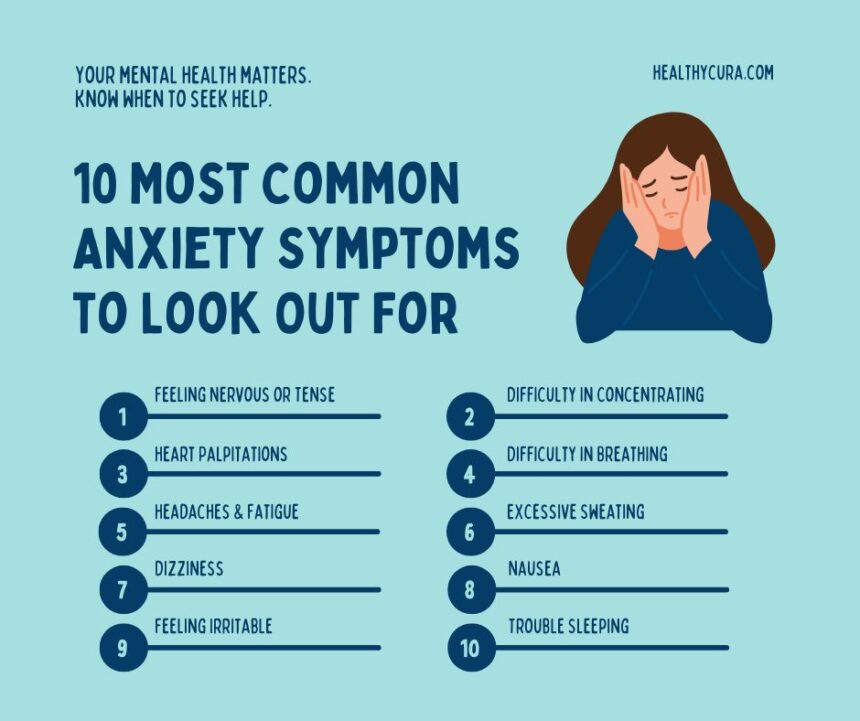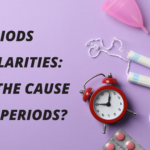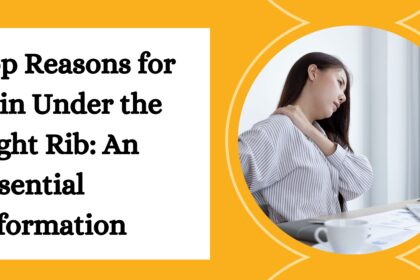Anxiety can manifest in several ways and affect different people in various ways. From physical to emotional, understanding the symptoms of anxiety is key to recognizing and managing it successfully.
Anxiety can be an overwhelming feeling, and it can manifest itself in a variety of ways. If you’re struggling to recognize anxiety when it strikes, here are 10 common symptoms to look out for.
It’s important to note that everyone experiences anxiety differently, so what may be a symptom for one person may not be the same for another. However, these 10 common symptoms tend to be consistent across all cases of anxiety.
Once you understand what they are, you’ll have a better idea of how to recognize and address your feelings of anxiousness.
What is Anxiety?
Anxiety is a state of mind that can range from a light to a strong feeling of unease, such as worry or fear.
Anxiety disorders are conditions that cause you to feel anxious all the time or most of the time and can interfere with your daily life.
There are different types of anxiety disorders, including generalized anxiety disorder, social anxiety disorder, and panic disorder.
Symptoms of anxiety can include a racing heart, sweating, shaking, shortness of breath, and feeling like you’re going to faint or have a heart attack.
If you have an anxiety disorder, you may also have other mental health problems, such as depression.
The Different Types of Anxiety Disorders
There are numerous types of anxiety disorders, and each one distinctly manifests itself.
Generalized anxiety disorder (GAD) is characterized by excessive worry and tension, even if there is little or nothing to provoke the anxiety.
Panic anxiety disorder is characterized by recurrent, unexpected panic attacks, as well as a persistent fear of future attacks.
Social anxiety disorder is marked by an intense fear of social or performance situations. Specific phobias are strong, irrational fears of specific objects or situations.
Obsessive-compulsive disorder (OCD) is defined by obsessions (recurrent, unwanted thoughts) and/or compulsions (repetitive behaviors that the individual feels compelled to do to relieve the anxiety).
The anxiety disorder known as post-traumatic stress disorder (PTSD) can manifest itself in those who have experienced or seen a traumatic event. This may be a single episode or recurring trauma such as physical or sexual abuse, natural disasters, war, or other life-threatening events.
Separation anxiety disorder is characterized by excessive fear and distress related to separation from home or loved ones.
Agoraphobia is intense fear and avoidance of places or situations where escape might be difficult in the event of a panic attack.
Anticipatory anxiety is a form of anxiety that occurs when anticipating future events.
In addition to these specific anxiety disorders, there are also other mental health conditions that involve anxiety, such as depression and bipolar disorder.
Here are the 10 Most Common Anxiety Symptoms
Feeling Nervous, Restless, or Tense
A common symptom of anxiety is feeling nervous or restless in situations where you would usually feel relaxed.
This could manifest as excessive fidgeting, difficulty sitting still for long periods, talking excessively, and constant tapping or pacing.
It’s a sign that your body is trying to “let off steam” from the build-up of anxious energy it feels.
If you’re feeling nervous, restless, or tense, it’s important to pay attention to your body and see if these feelings are accompanied by any other symptoms.
If you’re having trouble sleeping, feeling irritable, or experiencing muscle tension, these could be signs of an anxiety disorder.
It’s important to talk to a doctor if you’re experiencing any of these symptoms, as they can help you find the right treatment.
Racing Thoughts and Difficulty in Concentrating
Racing thoughts and difficulty in concentrating can be a sign of high levels of anxiety.
Anxiety can cause a person’s mind to become overactive, making it difficult for them to focus on one thought at a time and preventing them from making decisions easily or quickly.
A racing mind may be accompanied by feelings of confusion or an inability to respond to verbal stimuli promptly.
It’s common for people with anxiety to feel like they can’t focus on anything, or that their mind is constantly blank. If this is something you’re experiencing, it’s important to talk to your doctor about it.
Heart Palpitations – One of the Most challenging Anxiety Symptoms
Another common symptom of anxiety is physical symptoms relating to heart rate. Anxiety can have a direct impact on the heart, resulting in palpitations and an increase in heart rate.
This can be terrifying when it happens, but it’s usually not indicative of anything serious.
If you’re having heart palpitations, try to take some deep breaths and relax.
It may help to drink some water or eat something to calm your stomach. If the palpitations persist, see a doctor to rule out any other potential causes.
Difficulty in Breathing or Shortness of Breathing
Sometimes along with heart palpitation, anxiety can make it difficult to breathe properly, making it feel like you’re struggling for air and feeling light-headed as a result.
If you’re struggling with your breathing due to anxiety, try focusing on breathing exercises to get your body back under control.
In a fight or flight response, you may feel shortness of breath. This body response is triggered by the body’s stress hormones.
When the body is in a state of anxiety, it goes into survival mode and prepares for danger.
The heart rate increases and blood flow is diverted to the muscles so that the person can either run away or fight.
This increase in heart rate and blood flow can cause shortness of breath.
Headaches, Fatigue, Twitching, or Trembling
Anxiety can cause physical symptoms such as headaches and fatigue or muscle tension, even when there are no underlying illnesses to support them.
If you’re feeling tightness in your muscles or a throbbing sensation in your head, it could be a sign of anxiety.
Additionally, trembling or twitching of muscles is common when feeling anxious, particularly in the face or hands.
Try to stay aware of these symptoms if they arise and look into techniques that could help manage anxiety long-term – such as cognitive behavioral therapy (CBT).
If you’re experiencing these symptoms, it’s important to get help from a doctor or mental health professional. They can assess your symptoms and provide treatment that can help relieve your anxiety and improve your quality of life.
Excessive Sweating – From Common Anxiety Symptoms
Excessive sweating, including in areas not affected by temperature changes or physical activity, is a common symptom of anxiety.
Anxiety can cause physical symptoms like sweating or trembling. This is because when you’re anxious, your body goes into “fight or flight” mode.
This means that your body is preparing to either fight the threat or run away from it. As part of this response, your heart rate and blood pressure increase, and you start to breathe faster.
This can make you sweat or shake.
Dizziness
Dizziness can also arise from anxiety, which can lead to chest tightness and fatigue.
To differentiate between dizziness caused by anxiety and something else, pay attention to the context in which it arises – if it occurs when feeling anxious in a particular situation, then this is likely the cause. If not, then there may be other underlying issues.
Anxiety-related dizziness is a feeling of light-headedness, unsteadiness, or vertigo. People often say they feel like the room is spinning.
Dizziness can be triggered by anxiety or panic attacks, and can also be a symptom of other medical conditions such as inner ear infections or migraines.
If you are experiencing dizziness, it is important to see your doctor to rule out any underlying medical causes.
Nausea
Anxiety can cause a lot of different symptoms, and it can be hard to keep track of them all.
Nausea is one common symptom that people experience. It can be caused by several different things, including stress, anxiety, and even certain medications.
If you’re feeling nauseous, it’s important to pay attention to other symptoms you’re experiencing.
Feeling Irritable or On Edge
If you’re feeling irritable or on edge, it could be a sign of an anxiety disorder.
It’s normal to feel this way from time to time, but if these feelings are persistent and interfere with your daily life, it may be time to seek help.
Talk to your doctor about your symptoms so they can provide the right treatment plan for you.
Trouble Sleeping (Insomnia)
One of the most common anxiety symptoms is difficulty sleeping, or insomnia.
If you find yourself tossing and turning at night, or waking up frequently throughout the night, it could be a sign that your anxiety is starting to affect your sleep patterns.
Difficulty falling asleep is also a common symptom of anxiety and can leave you feeling exhausted during the day.
A visit to the doctor can help you and your doctor determine the cause of your sleep problems and the best course of treatment.
If you are experiencing any above 10 most common anxiety symptoms, it is important to seek professional help.
What Causes Anxiety?
There are many different things that can cause anxiety.
For some people, it may be caused by a specific event or situation, such as public speaking or taking a test.
For others, it may be more general, such as feeling constantly stressed about work or finances.
There are also some medical conditions that can cause anxiety, such as thyroid problems or heart disease. And for some people, there may be no clear reason why they feel anxious.
Match up these situations with the most common symptoms of anxiety, to become more sure.
If you’re not sure what’s causing your anxiety, it’s important to see a doctor or mental health professional to rule out any medical conditions.
Once you know what’s causing your anxiety, you can start working on ways to manage it.
How do I know if I have anxiety?
It can be difficult to tell if you have anxiety or another mental health disorder. Symptoms of anxiety can be similar to symptoms of other conditions, such as depression.
To help you figure out if you have anxiety, your doctor or mental health provider will ask you questions about your symptoms and talk to you about your thoughts, feelings, and behaviors.
Normal levels of nervousness or anxiousness are distinct from anxiety disorders. They are also different from fears that are a normal part of life.
For example, it is common to feel nervous when taking a test or going on a first date. People with anxiety disorders usually have these symptoms for six months or more.
If you are having anxiety, you may have some of the common symptoms that we have mentioned above, including difficulty sleeping or concentrating, racing thoughts, feeling on edge, and physical symptoms including a racing heartbeat and excessive sweating.
You may also have other symptoms such as avoidance of certain situations or activities, feeling like you’re in a fog, or having strong worries that seem irrational.
If you think you may have anxiety, it is important to talk to your doctor or a mental health professional. They can help diagnose and treat anxiety disorders, as well as provide support and resources.
How to Cope With Your Anxiety Symptoms
Anxiety can be a difficult emotion to cope with. It can be intrusive and overwhelming and can cause physical symptoms such as a racing heart and sweaty palms.
If you’re struggling to cope with anxiety, here are some tips that may help:
Identify your triggers. What situations or events tend to make your anxiety worse? Once you know what your triggers are, you can start to avoid them or plan for them in advance.
Practice relaxation techniques. Relaxation techniques such as deep breathing and progressive muscle relaxation can help to reduce the physical symptoms of anxiety.
Challenge negative thoughts. When you’re feeling anxious, it’s easy to fall into a spiral of negative thinking. Try to challenge these thoughts by asking yourself whether they’re true and evidence-based, and looking at the situation from a more positive perspective.
Avoid Fear. It can be tempting to try to avoid anything that makes you feel anxious, but this will only make the problem worse in the long run. Facing your fears is a vital step toward conquering them.
Seek professional help if necessary. If your anxiety is really affecting your day-to-day life, it might be worth seeking professional help from a therapist or counselor who can provide additional support and guidance.
By following these tips, you can help to manage your anxiety more effectively. Remember: it’s OK to feel anxious sometimes. Anxiety is a normal emotion that we all experience from time to time, and by learning how to cope with it, you can start to feel more in control of your emotions.
What are the Treatments for Anxiety?
There are many different treatments for anxiety, and the best treatment for you will depend on your particular symptoms and situation.
If your anxiety is mild, you may be able to manage it with relaxation techniques and lifestyle changes. If your anxiety is more severe, you may need medication or therapy.
There are several types of medication that can be effective in treating anxiety. These include anti-anxiety medications, antidepressants, and beta-blockers. Your doctor can help you decide which type of medication is right for you.
Cognitive-behavioral therapy (CBT) is a type of therapy that can be very effective in treating anxiety. CBT helps you to identify and change the thoughts and behaviors that contribute to your anxiety. Other types of therapy, such as exposure therapy, can also be helpful in treating anxiety.
Making certain lifestyle changes can also help to reduce anxiety. These changes might include exercise, relaxation techniques, and getting enough sleep.
There are also a variety of alternative treatments that may be helpful in managing anxiety, including yoga, meditation, acupuncture, and aromatherapy. Talk to your doctor about these options to see if they might be beneficial for you.
Medications for Anxiety Symptoms
There are many different types of medications that can be used to treat anxiety, and the best type of medication for you will depend on your individual symptoms and situation.
Some common medications that are used to treat anxiety include:
Anti-anxiety Medications
These drugs can help to reduce the symptoms of anxiety by decreasing the amount of worry and fear. Examples of anti-anxiety medications include lorazepam (Ativan), alprazolam (Xanax), and diazepam (Valium).
Selective Serotonin Reuptake Inhibitors (SSRIs)
SSRIs are a type of antidepressant that can also be effective in treating anxiety. Some common SSRIs are Prozac (fluoxetine), Zoloft (sertraline), and Paxil (paroxetine) (Paxil).
Tricyclic Antidepressants
Tricyclic antidepressants are another type of antidepressant that can be used to treat anxiety. Examples of tricyclic antidepressants include amitriptyline (Elavil) and imipramine (Tofranil).
Beta-blockers
Beta-blockers can be used to reduce physical symptoms of anxiety, such as a rapid heart rate and sweating. Propranolol (Inderal) and atenolol (Tenormin) are two common beta blockers.
Benzodiazepines
Benzodiazepines are sedatives that can help relieve feelings of anxiety. Examples of benzodiazepines include lorazepam (Ativan), alprazolam (Xanax), and diazepam (Valium).
It is important to speak with your doctor before starting any new medication, as some medications may cause unwanted side effects or interact with other medications you are taking.
Natural Remedies to Treat Anxiety Symptoms
Everyone feels anxious at some point or another. It’s the emotion we experience when we’re worried or nervous.
However, anxiety can be a debilitating condition for certain people. You are not alone in having anxiety. This condition affects millions of people all over the world.
Anxiety can be treated with a variety of methods, such as medication and therapy. However, some people like treating their anxiety with natural remedies rather than medications.
If you’re looking for natural ways to reduce your anxiety, here are a few options:
Exercise
Exercising is a fantastic method of relieving body tension and stress. Beneficial effects on mood and well-being are an added bonus. If you don’t already have an exercise routine, start by adding some simple activities to your day, such as walking or biking.
Yoga
Yoga is another great option for reducing stress and tension in the body. Yoga can also help to increase flexibility, strength, and breath control.
Meditation
Meditation is a practice that helps you focus and clear your mind. It doesn’t require any specialized facilities or expertise on your part, so you can do it just about any place. There are many various approaches to meditation; therefore, you should select the method that suits your needs the most.
Deep Breathing
Breathing deeply is a tried-and-true technique for reducing stress and regaining calmness. When you feel anxious or stressed, take a few moments to focus on your breath. Slowly inhale through your nose and exhale through your mouth, repeating this several times until you feel calmer.
Herbal Remedies
Some herbs, such as chamomile and lavender, have calming effects that can help reduce anxiety. You can drink herbal tea or take an herbal supplement to get these benefits.
These are just a few of the many natural remedies for anxiety. If you’re suffering from anxiety, talk to your doctor about the best treatment option for you.
Therapy for Anxiety Symptoms
Cognitive Behavioral Therapy (CBT)
Cognitive behavioral therapy (CBT) is the most effective treatment for anxiety disorders, according to the National Institute of Mental Health.
CBT helps you identify and change negative thinking and behavior patterns that contribute to your anxiety.
Anxiety problems can also be effectively treated with exposure therapy.
Exposure Therapy
Exposure therapy involves gradually exposing yourself to the things that make you anxious, starting with the least anxiety-provoking situation and working up to the most anxiety-provoking situation.
This can help you become less afraid of your fears and learn how to cope with them.
Support Groups Where You Can Look To Manage Anxiety Symptoms
Fortunately, there are numerous places to turn to for support if you or someone you love has anxiety problems. You can get help to eliminate your anxiety symptoms. There are a number of support groups specifically for anxiety that can provide valuable information and support. Here are a few:
Anxiety and Depression Association of America: This organization offers resources and support for those living with anxiety and depression. They have a number of helpful articles on their website, as well as a directory of support groups across the country.
National Alliance on Mental Illness: NAMI is a national organization that offers support and education for those living with mental illness, including anxiety disorders. They offer a variety of resources on their website, including a list of support groups in each state.
Psychology Today: Psychology Today offers a variety of resources for those living with anxiety, including a directory of support groups in each state.
Talk Space: Talk Space is an online therapy platform where you can connect with a licensed therapist and receive support for anxiety. They offer a variety of plans, including unlimited messaging with a therapist.
No matter where you are in your journey with anxiety, there is help and support available. These resources can help you find the people and information that you need to move forward in a positive direction.
When to Seek Help for Anxiety
If you experience any of the following symptoms on a regular basis, it may be time to seek help for anxiety:
- You feel anxious most days, for no specific reason.
- Your anxiety interferes with your work or school performance.
- You avoid activities or situations that make you feel anxious.
- You have trouble sleeping because of anxiety.
- You experience physical symptoms such as sweating, racing heart, or trembling when you’re feeling anxious.
- You feel overwhelmed by worry or fear and can’t seem to control it.
- You use drugs or alcohol to cope with anxious feelings.
- You experience panic attacks or severe anxiety in certain situations, such as public speaking or flying on an airplane.
- You have thoughts of hurting yourself or others due to your anxiety.
If you are experiencing any of these symptoms, it may be time to seek help for anxiety. Talking to a mental health professional can provide you with the support and resources you need to manage your anxiety.
In addition to seeking professional help, there are many things you can do at home to manage your anxiety.
These include participating in regular physical activity, engaging in relaxation techniques such as yoga or meditation, staying connected with friends or family members, and avoiding stimulants such as caffeine and alcohol.
Conclusion
Anxiety can be a difficult condition to deal with, but knowing the common symptoms is an important step in understanding and managing your anxiety.
Knowing how to recognize the symptoms of anxiety is essential for anyone struggling with this condition.
This list of 10 anxiety symptoms should help you become more aware of your own experience and encourage you to seek help if needed.
Remember, there’s no shame in asking for support when it comes to managing your mental health.
We hope that this article has provided you with useful information on the signs and symptoms of anxiety so that you can make informed decisions about how best to address your individual needs.
Remember, if your feelings are becoming difficult to manage it’s important to seek professional help for the best chance at regaining control of your mental health.






















